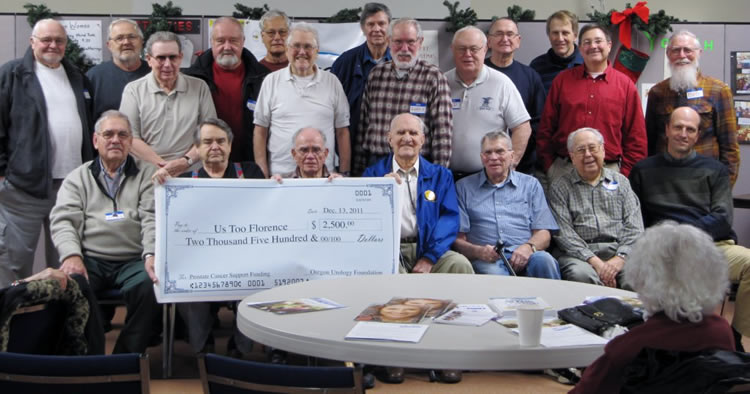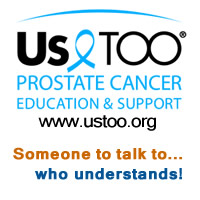|
||||||||
| Home | News You Can Use |
About Us TOO Florence |
Personal Journeys | Slideshows | Contact Us | |||
| Us TOO Florence receives a grant from Oregon Urology Foundation |
 |
|
Urologist Bryan Mehlhaff, MD, (front row – far right) presents a $2,500 check to the Us TOO Florence Prostate Cancer Education/Support Chapter on behalf of the Oregon Urology Foundation. (Photo by Marianne Horney) Located in Florence, Oregon, we had our beginning in 2001 as an American Cancer Society Man to Man Prostate Cancer Education/Support Group. We remained solely an ACS program until 2004 when we also became a chapter of Us TOO International Prostate Cancer Education/Support Network. From that time until the fall of 2010, we were part of both organizations and known as ACS/Us TOO Man to Man. During those years, both groups were in agreement that men should be offered a PSA/DRE at age 50. That made our affiliation with both groups an easy call. Two events changed the above relationship, occurring in 2009 and 2010. In 2009, the American Urologic Association revised its prostate cancer screening guidelines to recommend a man receive a baseline PSA/DRE at age 40 along with a comprehensive risk assessment. In March 2010, the American Cancer Society published its revised prostate cancer screening guidelines and retreated from its earlier recommendation. No longer should men be offered screening at age 50. Now, ACS was recommending instead that men at age 50 should first have a discussion with their doctor of the known and proven risks and the potential benefits of screening. Only after having that discussion should the men make the decision whether to be screened or not. It should be noted that the AUA also recommends that screening should only follow a discussion about the pros and cons of that screening. The fall-out of these two revised guidelines was that Us TOO Florence suddenly had to make a choice; the guidelines of the two groups were too diverse to even suggest we could support them both. Us TOO Florence threw its support behind the AUA guidelines in large part due to the personal experiences of members within the group. Simply put, those who were diagnosed early were alive and those who were diagnosed late were not. We had lost 15 men during those eight years and several more had metastatic disease before they were diagnosed – who probably would have been diagnosed pre-metastatic disease had they been following the new AUA guidelines. Our members were living and dying and we had a good idea why. This was not some game we were playing with data borne of studies. This was life and death. As of September 2010, the group officially severed its affiliation with ACS, continuing as a chapter of Us TOO International which supports the AUA guidelines. There is no question where Us TOO Florence stands – solidly behind the same AUA guidelines. |
Us TOO Florence has two meetings per month. Each meeting usually has a urologist in attendance. Second Tuesday evening of each month from 5:00 – 7:00 p.m. at the Presbyterian Church of the Siuslaw, 3996 Hwy. 101 N., Florence. Facilitator is Bob Horney, maribob@oregonfast.net or (541) 999-4239. Attending urologist is Dr. Bryan Mehlhaff – Oregon Urology Institute. Third Tuesday of each month from 12:00 – 1:00 (Lunch) at Kozy Kitchen Restaurant, 820 Hwy. 101, Florence. Facilitator is Jim Buch, tripletdad@oregonfast.net or (541) 997-8639. Attending urologist is Dr. Douglas Hoff – Oregon Urology Institute. |
| www.ustooflorence.org Copyright © 2010 - 2026 |

